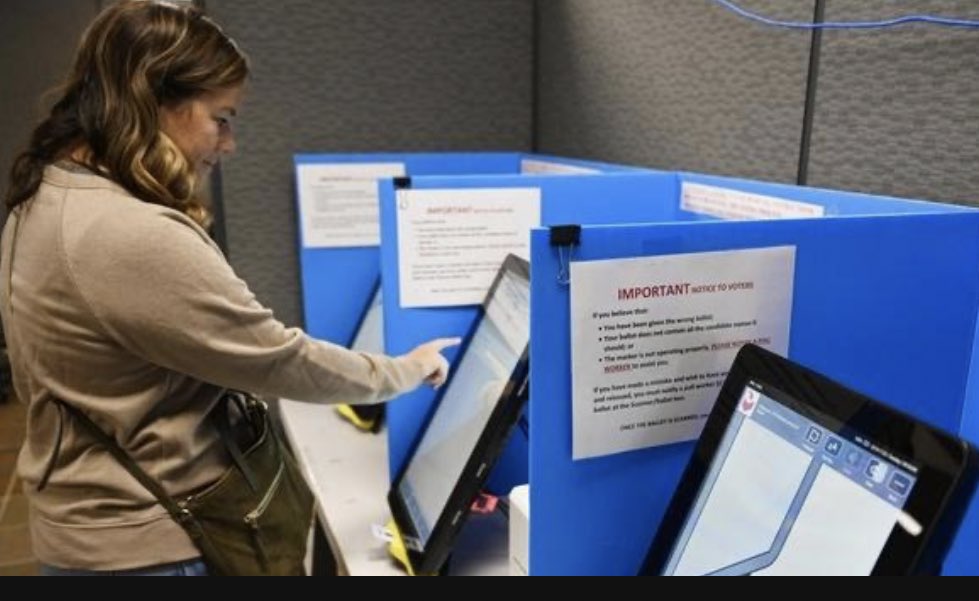October 12, 2020: Judge expresses concern about Georgia election system, but won't order immediate switch to hand-marked ballots https://www.onlineathens.com/news/20201012/judge-expresses-concern-about-georgia-election-system-but-wont-order-immediate-switch-to-hand-marked-ballots?template=ampart https://twitter.com/kylenabecker/status/1324934259199664129
ATLANTA — A federal judge on Sunday expressed serious concerns about Georgia's new election system but declined to order the state to abandon its touchscreen voting machines in favor of hand-marked paper ballots for the November election.
The new election system uses touchscreen voting machines — known as ballot-marking devices or BMDs — to print a paper ballot with a barcode that is read by a scanner.
The challenge "presents serious system security vulnerability and operational issues that may place... voters at risk of deprivation of their fundamental right to cast an effective vote that is accurately counted," US District Judge Amy Totenberg wrote in a 147-page order.
"The Court's Order has delved deep into the true risks posed by the new BMD voting system as well as its manner of implementation," Totenberg wrote. "These RISKS ARE NEITHER HYPOTHETICAL NOR REMOTE under the current circumstances."
The activists have shown that equipment and voter registration database problems during pilot elections last year and this year's June primary and August runoff elections "caused severe breakdowns at the polls, severely burdening voters' exercise of the franchise."
But the judge noted that U.S. Supreme Court precedent recognizes states' "authority and power to regulate their elections and the voting process itself" and ... that lower courts must use great restraint in ordering any substantial changes so close to an election.
For those reasons, Totenberg wrote, she must deny the activists' request for an immediate replacement of the new voting system with one that uses hand-marked paper ballots.
But she warned that "the vital issues identified in this case will not disappear or be appropriately addressed without focused State attention, resources, ongoing serious evaluation by independent cybersecurity experts, and open-mindedness."
"We are deeply disappointed that Georgia voters will be voting in this important election on unreliable touchscreen machines that PRODUCE RESULTS THAT CANNOT BE AUDITED," Marilyn Marks, executive director of the Coalition for Good Governance, a plaintiff in the suit, said.
The Carolinas have purchased new machines, but are the pricey tools reliable? https://wlos.com/amp/news/election/voting-machines-primary-election-carolina-election-systems-software-dominion-voting-systems
Some of the most popular ballot-marking machines, made by industry leaders Election Systems & Software and Dominion Voting Systems, register votes in bar codes that the human eye cannot decipher.
That's a problem, researchers say: Voters could end up with printouts that accurately spell out the names of the candidates they picked, but, because of a hack, the bar codes do not reflect those choices.
Because the bar codes are what's tabulated, voters would never know that their ballots benefited another candidate.
Software company linked to MI voter “glitch” also holds contracts in battleground states including PA, GA, AZ, NV https://www.ptnewsnetwork.com/breaking-software-company-linked-to-mi-voter-glitch-also-holds-contracts-in-battleground-states-including-pa-ga-az-nv/
Michigan Republicans claim software issue undercounted Trump votes https://nypost.com/2020/11/06/michigan-gop-claims-software-issue-undercounted-trump-votes/amp/
The Detroit Free Press reports that Antrim County uses Dominion Voting Systems equipment. Results are stored on computer cards at precincts, then uploaded to another computer by county election officials.
University of Michigan computer science professor J. Alex Halderman, a voting machine expert, told the Free Press that “it’s plausibly human error, but if a simple screw-up could cause these problems, that sounds like a technical design flaw.”
Election Integrity In Hands Of Companies With Security Problems https://sacramento.cbslocal.com/2018/10/29/election-integrity-security-problems/amp/
A trio of companies – ES&S of Omaha, Nebraska; Dominion Voting Systems of Denver and Hart InterCivic of Austin, Texas – sell and service more than 90 percent of the machinery on which votes are cast and results tabulated.
Experts say they have long skimped on security in favor of convenience, making it more difficult to detect intrusions...
The businesses also face no significant federal oversight and operate under a shroud of financial and operational secrecy despite their pivotal role underpinning American democracy.
Senators demand to know why election vendors still sell voting machines with ‘known vulnerabilities’ https://techcrunch.com/2019/03/27/senators-security-voting-machines/
The letter, sent Wednesday, calls on election equipment makers ES&S, Dominion Voting and Hart InterCivic to explain why they continue to sell decades-old machines, which the senators say contain security flaws that could undermine the results of elections if exploited.
Their primary concern is that the three companies have more than 90 percent of the U.S. election equipment market share, but their voting machines LACK PAPER BALLOTS OR AUDITABILITY, making it IMPOSSIBLE TO KNOW IF A VOTE WAS ACCURATELY COUNTED IN THE EVENT OF A BUG.

 Read on Twitter
Read on Twitter


